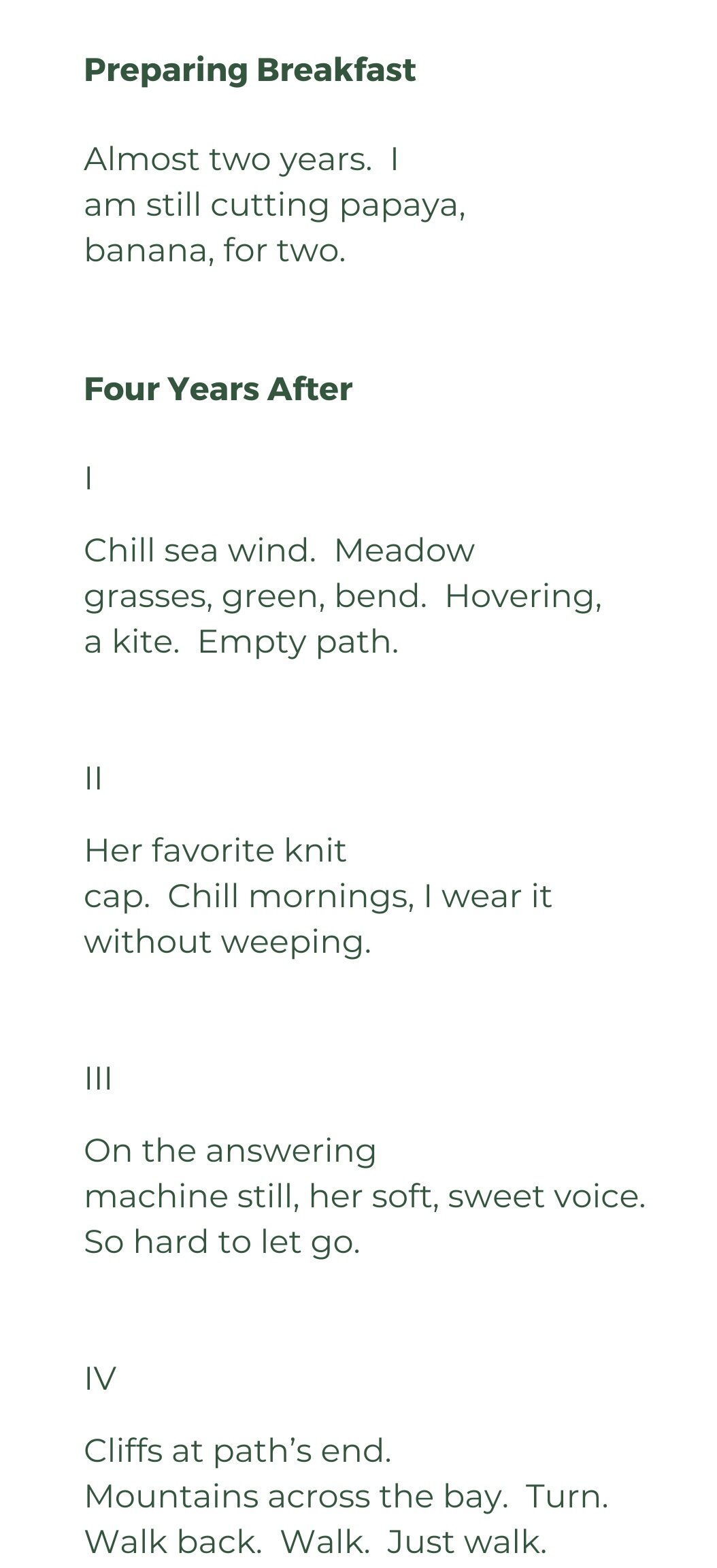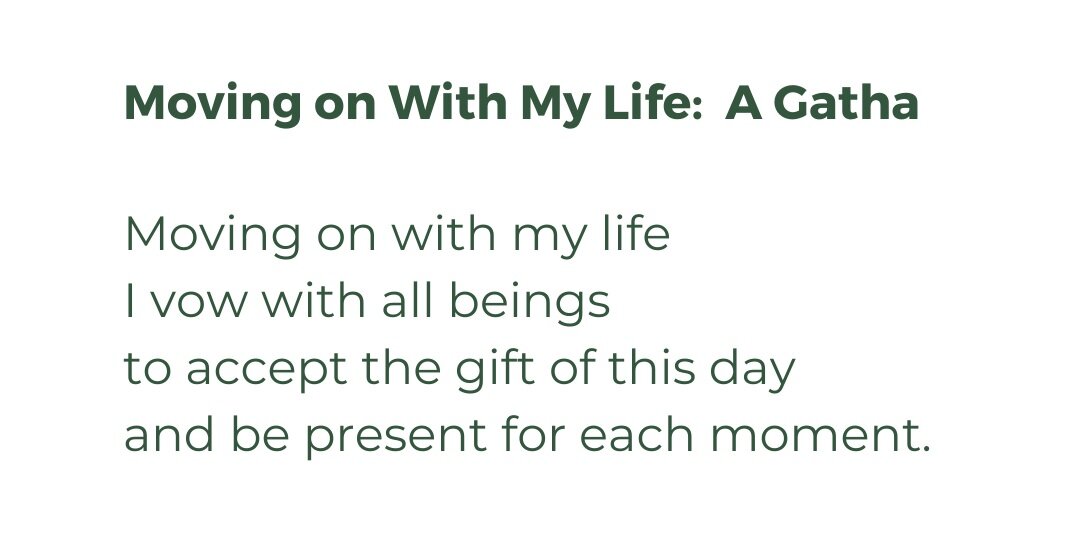Treasured Friendships — Part I
Today I want to share a few beautiful poems written by my dear friend, Elliot Ruchowitz-Roberts, which were published in the book, White Fire. But to do them justice—to have you understand why the ones I selected touch me so deeply—requires some context. So let me take you back twenty-seven years to when I first met Elliot’s wife, Tey Roberts.
When I became a Zen student at the Monterey Bay Zen Center in 1993, it took a while for me to feel embraced by the tight-knit group. It was only Tey, in her mid-fifties when I was thirty, who warmly reached out to me. A retired lawyer who was a devoted gardener, photographer, political activist, avid hiker and world explorer, Tey was a petite woman with a big-heart and great sense of humor. Like me, she had been born into a Jewish family in New York City. We shared a kinship over our mutual struggles with unrelenting fear and worry, often laughing together about how trapped we both felt by our neuroses, despite our prolonged and extremely sincere efforts to learn to trust life a bit more and relax.
Sixteen years after I first met Tey, my attendance at the Zen Center had grown sporadic, and I wasn’t in close touch with my friends there. So, when I showed up one Tuesday evening at the end of 2009, and the group began chanting the prayer for protecting life for Tey while looking especially solemn, I had no idea why. The two of us hadn’t spoken in quite some time. When I asked what was going on, I found out that after a long search for an explanation for Tey’s alarming physical symptoms, she was in the process of getting definitive confirmation that she had ALS. I felt as if I had been smacked down by a powerful tidal wave. Overcome by terror, grief, and heartbreak, I couldn’t stop crying
Tey and Elliot in 1994
The next day, I called Tey’s house and spoke to her husband Elliot, who I’d only met briefly a few times over the years. After Elliot put me on hold for a while to confirm that Tey was willing to see me, he explained that she wanted people thoroughly warned about her condition so they wouldn’t be too shocked by her extremely slurred speech and lack of mobility, which were both quickly worsening.
I was petrified to see her. ALS always triggered horror and panic in me. Now, someone I loved had it—someone who had always feared the worst, just like me.
Two days later, I arrived at Tey and Elliot’s home. I had never been there before, and felt a surge of delight seeing their charming little cottage nestled amid beautiful plants, trees, and meandering walkways. It was a lush, love-filled, enchanting place. Elliot had done almost all of the carpentry by hand and Tey was a gifted gardener. I could feel the love in the air.
Elliot welcomed me at the door, and then took me inside to Tey, who sat reclined, propped up by pillows, on a built-in platform bed. I climbed onto the bed next to her. We held hands and cried.
Tey’s speech was challenging to understand, but I could decipher most of her words. We talked for a long time that first day, which was very fortunate, because that would be the last time so much conversation was possible. Despite the difficult new road Tey was traveling and her concerns about her terrible disease and grieving family, she had a peacefulness about her that surprised me. She told me how helpful her Zen practice had been during this time. It was coming through when she needed it most.
At one point, Tey looked me in the eye with focused intensity. I knew she had something important to say. “It’s gone,” she said. “The fear is gone.” Astonishment and gratitude shone clearly in her eyes. Despite her body’s accelerating limitations, in one new and crucial way, Tey was finally free.
As Tey began to tire, I knew I shouldn’t stay much longer. But before I left, I felt moved to share something with her. A few months earlier, during a trip to Tucson, I’d had a few sessions with a powerful Tibetan sound healer who had given me a meditation that resonated so deeply with me I’d been doing it every day. It suddenly felt clear to me that I’d been entrusted with it so that I could pass it on to Tey. Although part of me second-guessed my instinct, I asked Tey if she wanted to try it. She did.
Tey and I lay back together—side-by-side, our fingers intertwined—and I walked us through the sequence I’d been taught.
We imagined our bodies being held by the earth, relaxing into the earth, being joyfully welcomed and eventually absorbed by the earth. Everything particular to us—our flesh, our bones, our blood, our minds, our thoughts, our personalities—became part of the earth’s elements. And then we watched our souls rise up, our energy expanding and merging into boundless light and love—a state I now call “eternal sunshine.”
Tey and I held hands the whole time. As our souls were freed, I felt my heart turn into vibrant golden energy, and through our hands, I felt the golden energy of Tey’s heart as well as my own. We were linked. Through our hands, arms, and hearts, an unbroken current of golden light traveled between us. Then Tey turned to look at me and said, “You feel that, right? Our hearts are connected.”
And that is how I began my weekly visits to Tey and Elliot’s home.
For the next few months, except for when I was traveling, I showed up every week with an organic lunch for Elliot to eat while I spent time with Tey. Every week, I felt enthusiastically welcomed.
As Tey’s ability to speak declined, I entertained her with stories about my life, business and kids. Those times were filled more with joy than sadness. While I was with Tey, I was completely present, tuning into her with all of my senses so I could intuit her needs and what she was trying to communicate. Every minute felt precious.
One of our most special moments came when Tey could no longer feed herself. She had dreaded getting to that point, and during one of our visits, when she was struggling to raise her spoon, I asked if I could feed her. She nodded her assent. I took over the task, and slowly brought spoonfuls of nourishment to her mouth. A Jewish mama through and through, I found that I loved feeding her. And she enjoyed being fed by me, lightened by having released the futile struggle to maintain this specific independence. We were both surprised by how deeply sweet and tender it felt.
I was with Tey and her family the evening before she passed on March 1, 2010. Our Zen teacher, Katherine Thanas, had come to her home with a few other Zen students to conduct a Lay Entrustment ceremony—an expression of a Zen teacher’s trust in a long-time lay student to share teachings with others. Tey had been preparing for this milestone before her illness set in, and Katherine knew how important the ceremony was to her.
Tey Roberts and Zen teacher, Katherine Thanas, at Tey’s Jukai ceremony in November 2006, when she formally became a buddhist. Photos by Anne Muraski
Having Elliot and Tey welcome me in to share the intimate process of Tey’s journey towards death was one of the most precious experiences of my life. Their home became a sanctuary of boundless love and tenderness, and it was Elliot who set the tone. He cared for his beloved wife of fifty years with complete adoration, reverence, gentleness, and respect.
Here is the poem Elliot wrote for her on May 1, 2010, two months after her death:
I continued to visit Elliot regularly during the months after Tey passed, often ordering Zabar’s deli to be shipped overnight from Manhattan—comfort food and loving company being the only things I could offer this extraordinary, tender-hearted man.
Elliot & Katherine, photo by Myra, circa 2011
Later, Elliot and I met for walks at Point Lobos, where he’d share his binoculars and teach me details about the behaviors of local wildlife I’d never imagined. We’d drive up to Santa Cruz together to visit Katherine Thanas—taking her out for lunch, then heading back to her house for tea and a sweet. When I was invited by the Middlebury Institute of International Studies to deliver their commencement address in the spring of 2012, Elliot (who had taught composition, literature, public speaking and humanities at Monterey Peninsula College for thirty-two years) patiently read my speech again and again, through countless iterations, and coached me on my delivery (he still laughs that his biggest contribution was telling me to break my pages at complete paragraphs, not mid-sentence).
When my father died in September of 2012, it was Elliot I telephoned as I sat alone with his body at his assisted living facility. I needed to call a mortuary, and he gave me the name and number of the very kind man that had come for Tey.
Years passed, and grief was Elliot’s constant companion. Here are two of the many poignant haiku he wrote in his grief:
Elliot helped me learn about the nature of grief. There are no formulas that will predict when it will stop being excruciating to live without the ones we love most by our side. Logic is irrelevant. Grief must be given the space it needs, and pain must be digested slowly. It takes time to adjust to radical change, and for life to begin to regain its appeal. Grieving requires trust, strength and endurance. To love so deeply is to be raw and vulnerable. Elliot allowed himself to feel. He let his tears flow freely.
Eventually he wrote this poem:
“Gatha,” a Sanskrit word for “verse,” refers to a prayer, a vow, an affirmation. Soon after writing this poem, a new love, Deborah Sharp, came into Elliot’s life like a magical explosion of joy and sunlight. Lucky for me, through Elliot, she also came into my life.
Stay tuned to meet Deborah in next week’s essay, “Treasured Friendships, Part II.”
Elliot’s most recent book of poems, White Fire, published by Ping-Pong Free Press, is available from the Henry Miller Memorial Library.









